Exploring War, Heroism, and Humanity in Findley's 'The Wars'
VerifiedAdded on 2023/06/11
|5
|1440
|118
Essay
AI Summary
This essay delves into Timothy Findley's historical meta-fiction, "The Wars," analyzing the mental torment and guilt experienced by soldiers during World War I. It explores the novel's repudiation of traditional concepts of heroism and bravery in war, highlighting the inhumane aspects of conflict and the psychological impact on characters like Robert Ross. The essay discusses the protagonist's internal battles, the symbolism used throughout the novel, and the diverging opinions on Ross's actions. Ultimately, the analysis emphasizes Findley's aim to challenge conventional views of war and expose its inherent ugliness and horror through various literary devices and character perspectives. This essay provides a comprehensive overview of the novel's themes and literary significance.
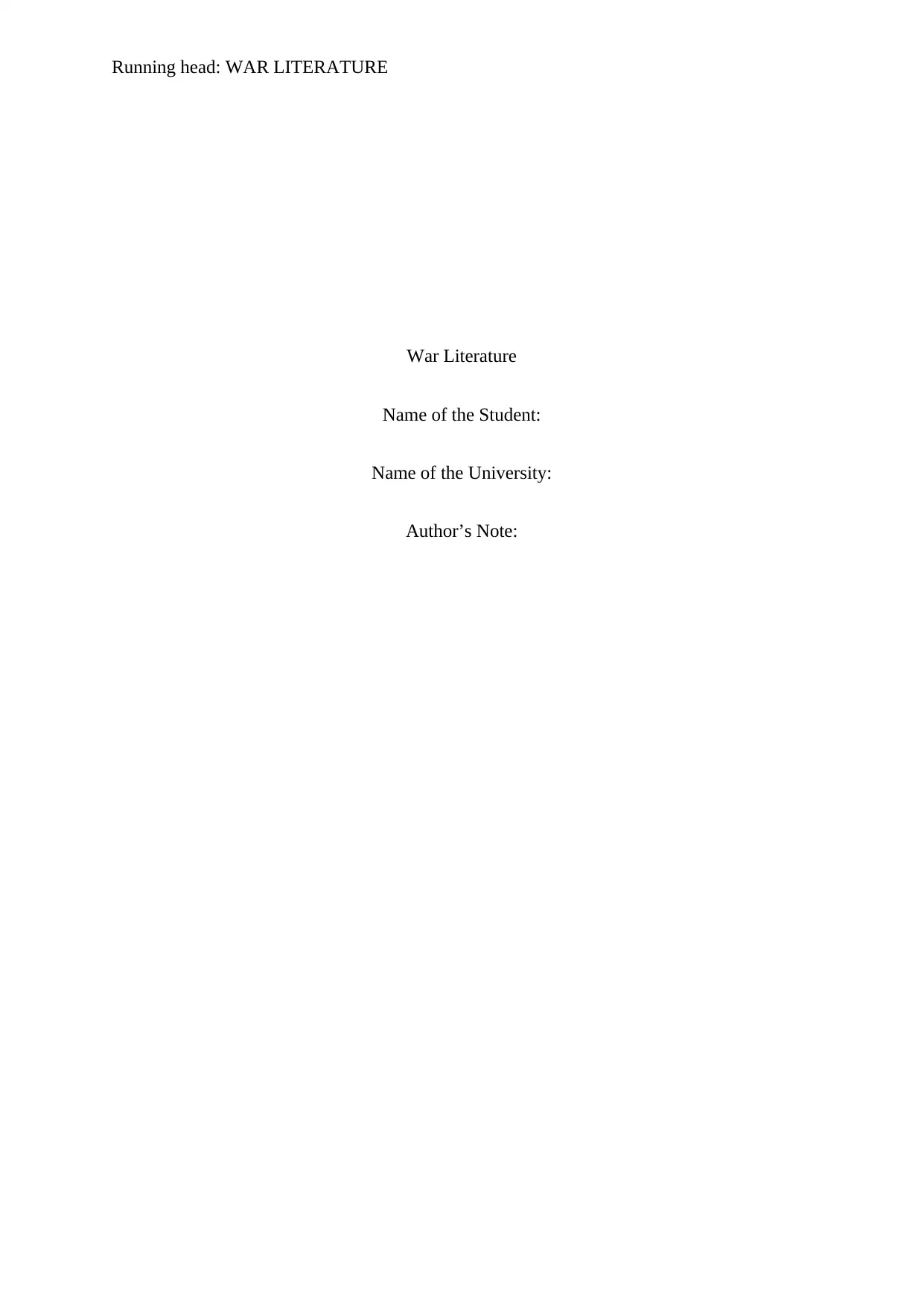
Running head: WAR LITERATURE
War Literature
Name of the Student:
Name of the University:
Author’s Note:
War Literature
Name of the Student:
Name of the University:
Author’s Note:
Paraphrase This Document
Need a fresh take? Get an instant paraphrase of this document with our AI Paraphraser
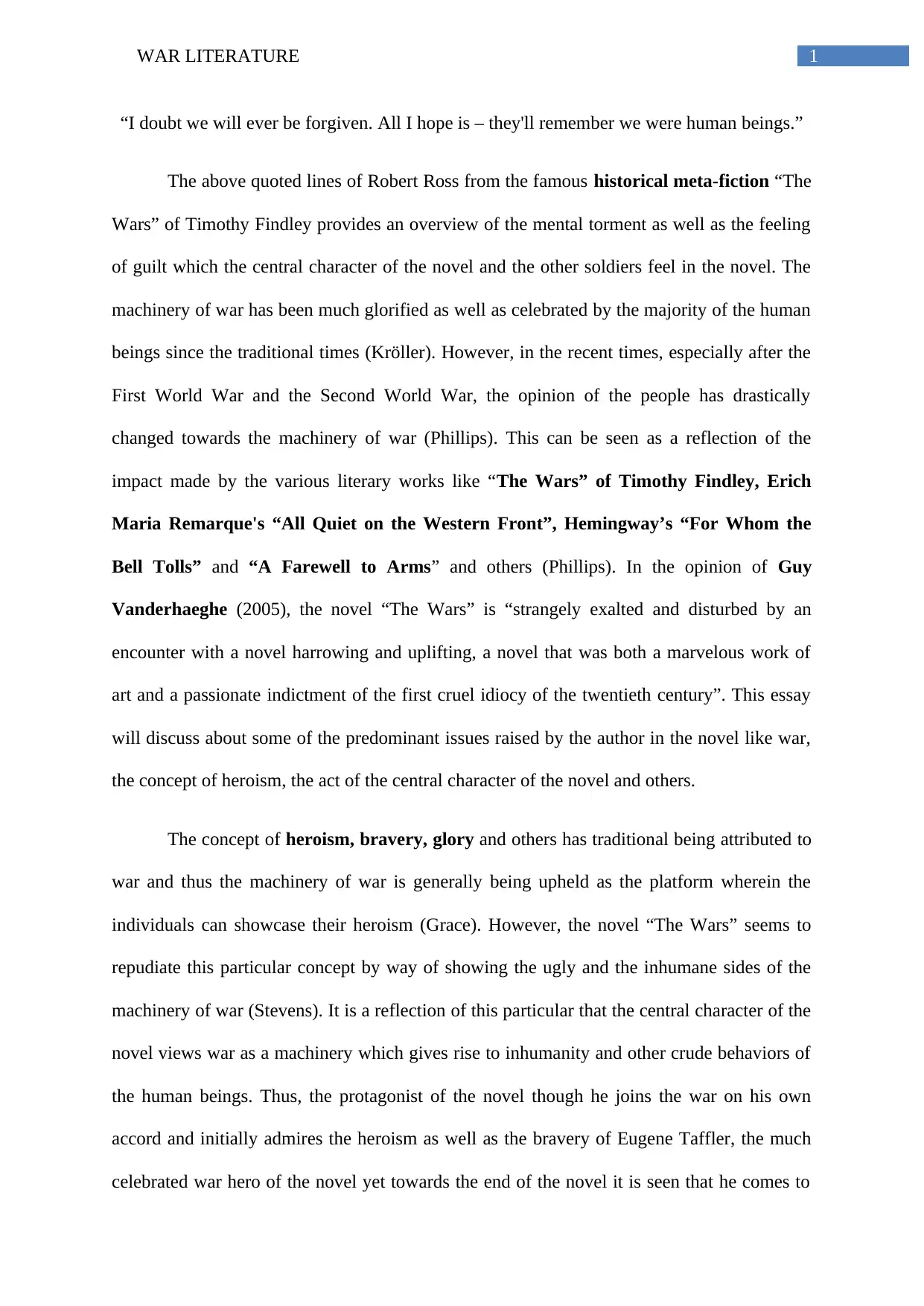
1WAR LITERATURE
“I doubt we will ever be forgiven. All I hope is – they'll remember we were human beings.”
The above quoted lines of Robert Ross from the famous historical meta-fiction “The
Wars” of Timothy Findley provides an overview of the mental torment as well as the feeling
of guilt which the central character of the novel and the other soldiers feel in the novel. The
machinery of war has been much glorified as well as celebrated by the majority of the human
beings since the traditional times (Kröller). However, in the recent times, especially after the
First World War and the Second World War, the opinion of the people has drastically
changed towards the machinery of war (Phillips). This can be seen as a reflection of the
impact made by the various literary works like “The Wars” of Timothy Findley, Erich
Maria Remarque's “All Quiet on the Western Front”, Hemingway’s “For Whom the
Bell Tolls” and “A Farewell to Arms” and others (Phillips). In the opinion of Guy
Vanderhaeghe (2005), the novel “The Wars” is “strangely exalted and disturbed by an
encounter with a novel harrowing and uplifting, a novel that was both a marvelous work of
art and a passionate indictment of the first cruel idiocy of the twentieth century”. This essay
will discuss about some of the predominant issues raised by the author in the novel like war,
the concept of heroism, the act of the central character of the novel and others.
The concept of heroism, bravery, glory and others has traditional being attributed to
war and thus the machinery of war is generally being upheld as the platform wherein the
individuals can showcase their heroism (Grace). However, the novel “The Wars” seems to
repudiate this particular concept by way of showing the ugly and the inhumane sides of the
machinery of war (Stevens). It is a reflection of this particular that the central character of the
novel views war as a machinery which gives rise to inhumanity and other crude behaviors of
the human beings. Thus, the protagonist of the novel though he joins the war on his own
accord and initially admires the heroism as well as the bravery of Eugene Taffler, the much
celebrated war hero of the novel yet towards the end of the novel it is seen that he comes to
“I doubt we will ever be forgiven. All I hope is – they'll remember we were human beings.”
The above quoted lines of Robert Ross from the famous historical meta-fiction “The
Wars” of Timothy Findley provides an overview of the mental torment as well as the feeling
of guilt which the central character of the novel and the other soldiers feel in the novel. The
machinery of war has been much glorified as well as celebrated by the majority of the human
beings since the traditional times (Kröller). However, in the recent times, especially after the
First World War and the Second World War, the opinion of the people has drastically
changed towards the machinery of war (Phillips). This can be seen as a reflection of the
impact made by the various literary works like “The Wars” of Timothy Findley, Erich
Maria Remarque's “All Quiet on the Western Front”, Hemingway’s “For Whom the
Bell Tolls” and “A Farewell to Arms” and others (Phillips). In the opinion of Guy
Vanderhaeghe (2005), the novel “The Wars” is “strangely exalted and disturbed by an
encounter with a novel harrowing and uplifting, a novel that was both a marvelous work of
art and a passionate indictment of the first cruel idiocy of the twentieth century”. This essay
will discuss about some of the predominant issues raised by the author in the novel like war,
the concept of heroism, the act of the central character of the novel and others.
The concept of heroism, bravery, glory and others has traditional being attributed to
war and thus the machinery of war is generally being upheld as the platform wherein the
individuals can showcase their heroism (Grace). However, the novel “The Wars” seems to
repudiate this particular concept by way of showing the ugly and the inhumane sides of the
machinery of war (Stevens). It is a reflection of this particular that the central character of the
novel views war as a machinery which gives rise to inhumanity and other crude behaviors of
the human beings. Thus, the protagonist of the novel though he joins the war on his own
accord and initially admires the heroism as well as the bravery of Eugene Taffler, the much
celebrated war hero of the novel yet towards the end of the novel it is seen that he comes to
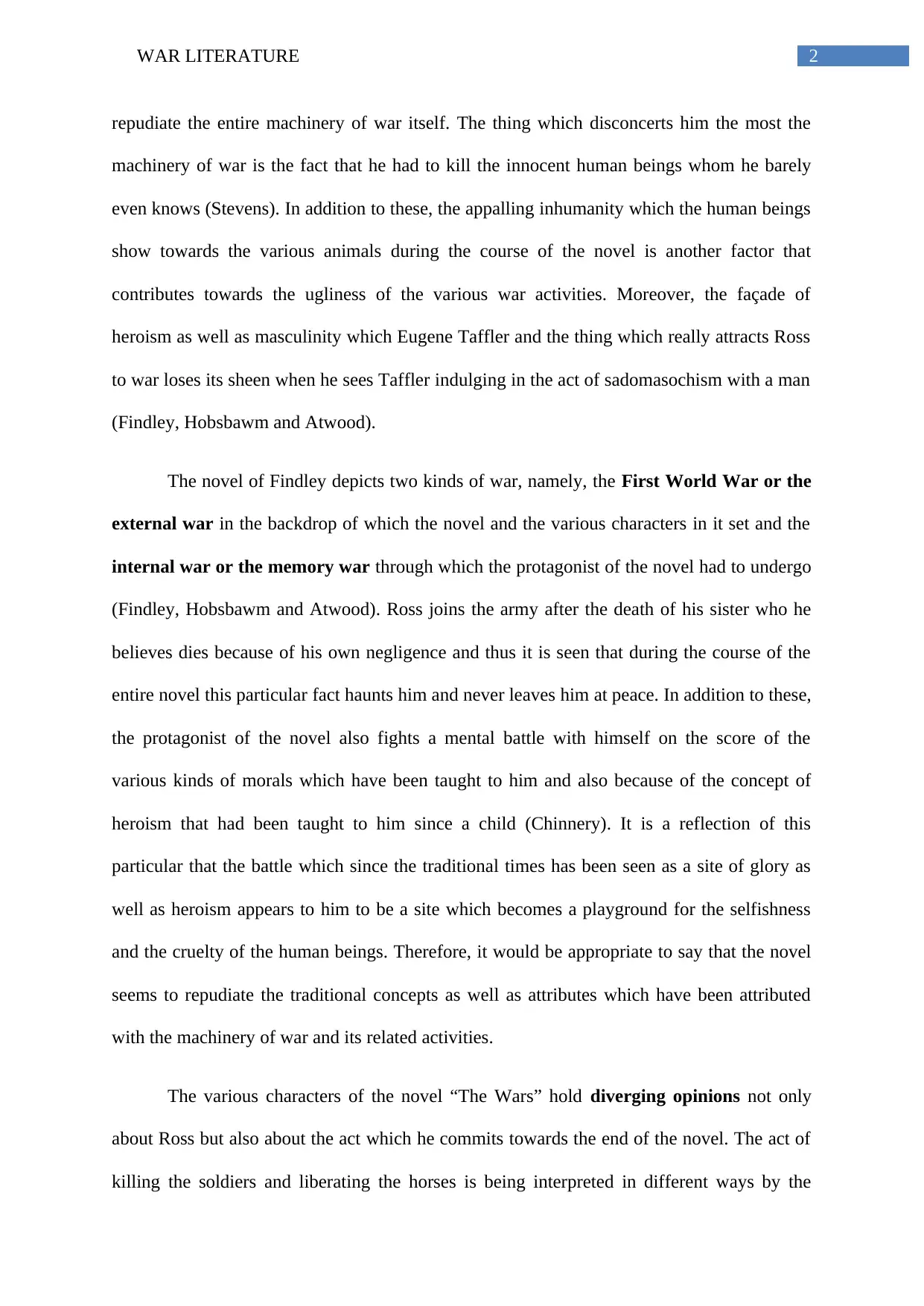
2WAR LITERATURE
repudiate the entire machinery of war itself. The thing which disconcerts him the most the
machinery of war is the fact that he had to kill the innocent human beings whom he barely
even knows (Stevens). In addition to these, the appalling inhumanity which the human beings
show towards the various animals during the course of the novel is another factor that
contributes towards the ugliness of the various war activities. Moreover, the façade of
heroism as well as masculinity which Eugene Taffler and the thing which really attracts Ross
to war loses its sheen when he sees Taffler indulging in the act of sadomasochism with a man
(Findley, Hobsbawm and Atwood).
The novel of Findley depicts two kinds of war, namely, the First World War or the
external war in the backdrop of which the novel and the various characters in it set and the
internal war or the memory war through which the protagonist of the novel had to undergo
(Findley, Hobsbawm and Atwood). Ross joins the army after the death of his sister who he
believes dies because of his own negligence and thus it is seen that during the course of the
entire novel this particular fact haunts him and never leaves him at peace. In addition to these,
the protagonist of the novel also fights a mental battle with himself on the score of the
various kinds of morals which have been taught to him and also because of the concept of
heroism that had been taught to him since a child (Chinnery). It is a reflection of this
particular that the battle which since the traditional times has been seen as a site of glory as
well as heroism appears to him to be a site which becomes a playground for the selfishness
and the cruelty of the human beings. Therefore, it would be appropriate to say that the novel
seems to repudiate the traditional concepts as well as attributes which have been attributed
with the machinery of war and its related activities.
The various characters of the novel “The Wars” hold diverging opinions not only
about Ross but also about the act which he commits towards the end of the novel. The act of
killing the soldiers and liberating the horses is being interpreted in different ways by the
repudiate the entire machinery of war itself. The thing which disconcerts him the most the
machinery of war is the fact that he had to kill the innocent human beings whom he barely
even knows (Stevens). In addition to these, the appalling inhumanity which the human beings
show towards the various animals during the course of the novel is another factor that
contributes towards the ugliness of the various war activities. Moreover, the façade of
heroism as well as masculinity which Eugene Taffler and the thing which really attracts Ross
to war loses its sheen when he sees Taffler indulging in the act of sadomasochism with a man
(Findley, Hobsbawm and Atwood).
The novel of Findley depicts two kinds of war, namely, the First World War or the
external war in the backdrop of which the novel and the various characters in it set and the
internal war or the memory war through which the protagonist of the novel had to undergo
(Findley, Hobsbawm and Atwood). Ross joins the army after the death of his sister who he
believes dies because of his own negligence and thus it is seen that during the course of the
entire novel this particular fact haunts him and never leaves him at peace. In addition to these,
the protagonist of the novel also fights a mental battle with himself on the score of the
various kinds of morals which have been taught to him and also because of the concept of
heroism that had been taught to him since a child (Chinnery). It is a reflection of this
particular that the battle which since the traditional times has been seen as a site of glory as
well as heroism appears to him to be a site which becomes a playground for the selfishness
and the cruelty of the human beings. Therefore, it would be appropriate to say that the novel
seems to repudiate the traditional concepts as well as attributes which have been attributed
with the machinery of war and its related activities.
The various characters of the novel “The Wars” hold diverging opinions not only
about Ross but also about the act which he commits towards the end of the novel. The act of
killing the soldiers and liberating the horses is being interpreted in different ways by the
⊘ This is a preview!⊘
Do you want full access?
Subscribe today to unlock all pages.

Trusted by 1+ million students worldwide
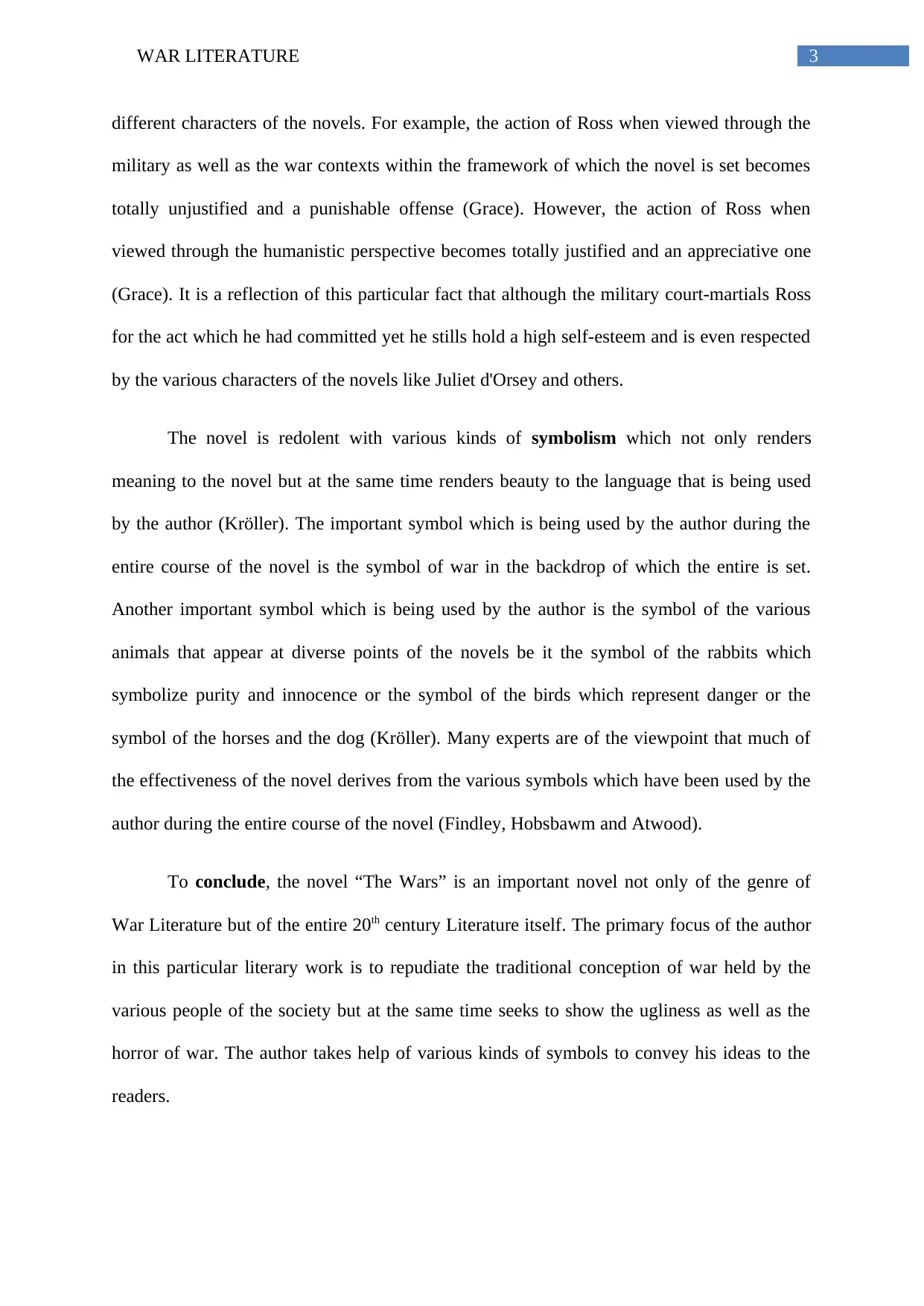
3WAR LITERATURE
different characters of the novels. For example, the action of Ross when viewed through the
military as well as the war contexts within the framework of which the novel is set becomes
totally unjustified and a punishable offense (Grace). However, the action of Ross when
viewed through the humanistic perspective becomes totally justified and an appreciative one
(Grace). It is a reflection of this particular fact that although the military court-martials Ross
for the act which he had committed yet he stills hold a high self-esteem and is even respected
by the various characters of the novels like Juliet d'Orsey and others.
The novel is redolent with various kinds of symbolism which not only renders
meaning to the novel but at the same time renders beauty to the language that is being used
by the author (Kröller). The important symbol which is being used by the author during the
entire course of the novel is the symbol of war in the backdrop of which the entire is set.
Another important symbol which is being used by the author is the symbol of the various
animals that appear at diverse points of the novels be it the symbol of the rabbits which
symbolize purity and innocence or the symbol of the birds which represent danger or the
symbol of the horses and the dog (Kröller). Many experts are of the viewpoint that much of
the effectiveness of the novel derives from the various symbols which have been used by the
author during the entire course of the novel (Findley, Hobsbawm and Atwood).
To conclude, the novel “The Wars” is an important novel not only of the genre of
War Literature but of the entire 20th century Literature itself. The primary focus of the author
in this particular literary work is to repudiate the traditional conception of war held by the
various people of the society but at the same time seeks to show the ugliness as well as the
horror of war. The author takes help of various kinds of symbols to convey his ideas to the
readers.
different characters of the novels. For example, the action of Ross when viewed through the
military as well as the war contexts within the framework of which the novel is set becomes
totally unjustified and a punishable offense (Grace). However, the action of Ross when
viewed through the humanistic perspective becomes totally justified and an appreciative one
(Grace). It is a reflection of this particular fact that although the military court-martials Ross
for the act which he had committed yet he stills hold a high self-esteem and is even respected
by the various characters of the novels like Juliet d'Orsey and others.
The novel is redolent with various kinds of symbolism which not only renders
meaning to the novel but at the same time renders beauty to the language that is being used
by the author (Kröller). The important symbol which is being used by the author during the
entire course of the novel is the symbol of war in the backdrop of which the entire is set.
Another important symbol which is being used by the author is the symbol of the various
animals that appear at diverse points of the novels be it the symbol of the rabbits which
symbolize purity and innocence or the symbol of the birds which represent danger or the
symbol of the horses and the dog (Kröller). Many experts are of the viewpoint that much of
the effectiveness of the novel derives from the various symbols which have been used by the
author during the entire course of the novel (Findley, Hobsbawm and Atwood).
To conclude, the novel “The Wars” is an important novel not only of the genre of
War Literature but of the entire 20th century Literature itself. The primary focus of the author
in this particular literary work is to repudiate the traditional conception of war held by the
various people of the society but at the same time seeks to show the ugliness as well as the
horror of war. The author takes help of various kinds of symbols to convey his ideas to the
readers.
Paraphrase This Document
Need a fresh take? Get an instant paraphrase of this document with our AI Paraphraser
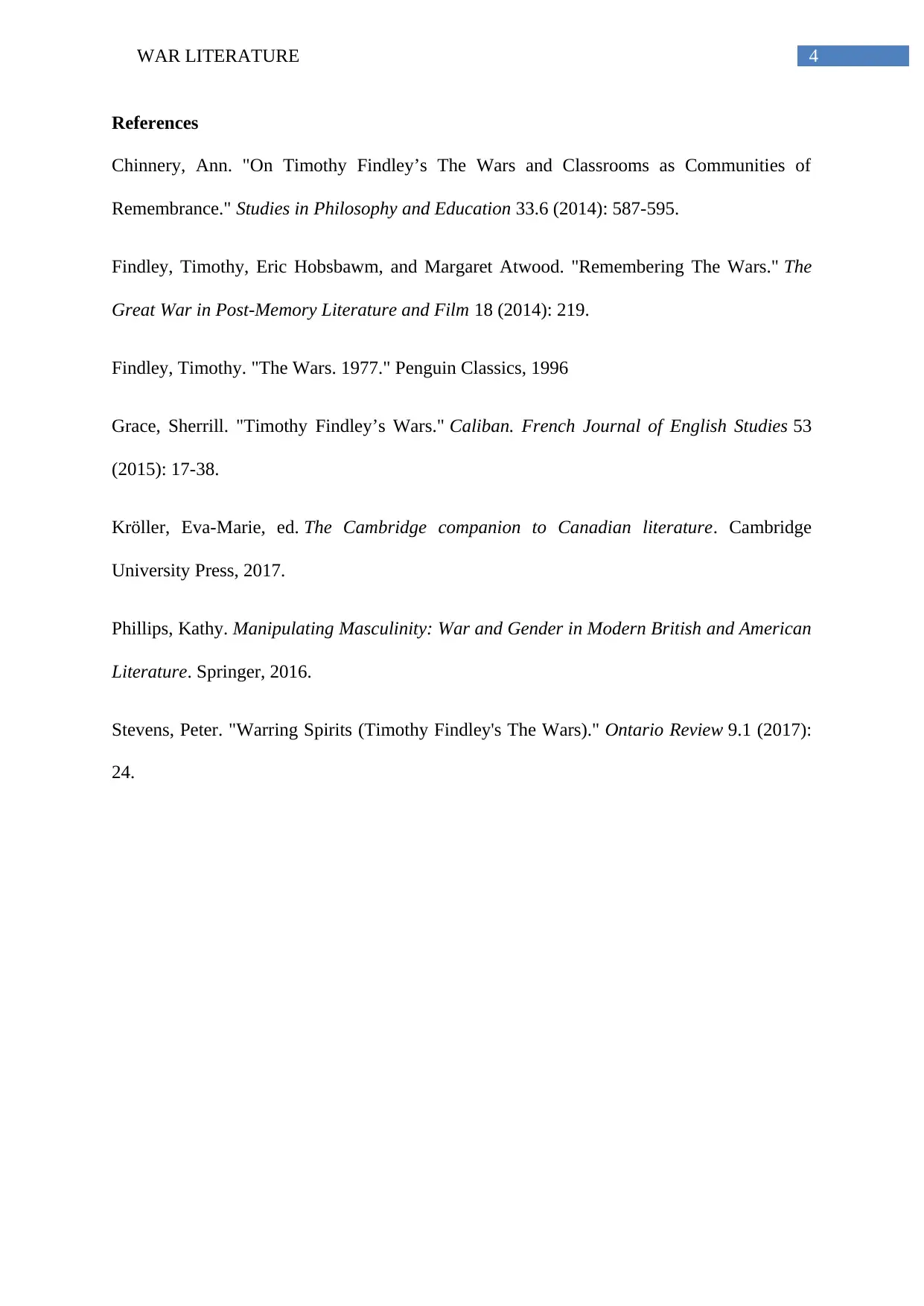
4WAR LITERATURE
References
Chinnery, Ann. "On Timothy Findley’s The Wars and Classrooms as Communities of
Remembrance." Studies in Philosophy and Education 33.6 (2014): 587-595.
Findley, Timothy, Eric Hobsbawm, and Margaret Atwood. "Remembering The Wars." The
Great War in Post-Memory Literature and Film 18 (2014): 219.
Findley, Timothy. "The Wars. 1977." Penguin Classics, 1996
Grace, Sherrill. "Timothy Findley’s Wars." Caliban. French Journal of English Studies 53
(2015): 17-38.
Kröller, Eva-Marie, ed. The Cambridge companion to Canadian literature. Cambridge
University Press, 2017.
Phillips, Kathy. Manipulating Masculinity: War and Gender in Modern British and American
Literature. Springer, 2016.
Stevens, Peter. "Warring Spirits (Timothy Findley's The Wars)." Ontario Review 9.1 (2017):
24.
References
Chinnery, Ann. "On Timothy Findley’s The Wars and Classrooms as Communities of
Remembrance." Studies in Philosophy and Education 33.6 (2014): 587-595.
Findley, Timothy, Eric Hobsbawm, and Margaret Atwood. "Remembering The Wars." The
Great War in Post-Memory Literature and Film 18 (2014): 219.
Findley, Timothy. "The Wars. 1977." Penguin Classics, 1996
Grace, Sherrill. "Timothy Findley’s Wars." Caliban. French Journal of English Studies 53
(2015): 17-38.
Kröller, Eva-Marie, ed. The Cambridge companion to Canadian literature. Cambridge
University Press, 2017.
Phillips, Kathy. Manipulating Masculinity: War and Gender in Modern British and American
Literature. Springer, 2016.
Stevens, Peter. "Warring Spirits (Timothy Findley's The Wars)." Ontario Review 9.1 (2017):
24.
1 out of 5
Your All-in-One AI-Powered Toolkit for Academic Success.
+13062052269
info@desklib.com
Available 24*7 on WhatsApp / Email
![[object Object]](/_next/static/media/star-bottom.7253800d.svg)
Unlock your academic potential
Copyright © 2020–2026 A2Z Services. All Rights Reserved. Developed and managed by ZUCOL.